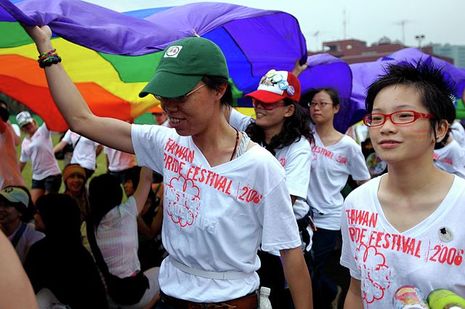Same-sex reproductive rights are as important as marriage rights
With a spotlight on Taiwan, Staff Writer Yan-Yi Lee and Jung Chen argue that reproductive rights for same-sex couples deserve more attention

In May 2019, a Taiwanese gay couple — let’s call them Cheng and Shuo — were marching proudly along with the wave of celebrations in Taipei, Taiwan. Same-sex marriage, as announced on the news, had just been legalised. Like the grand majority of Taiwanese youth, they couldn’t be more elated — it was a historic first in Asia, an event that would shape their lives forever.
“Current Taiwanese law poses a barrier for same-sex couples who want children”
While tying the knot isn’t an issue anymore, tougher issues linger on the horizon. Cheng and Shuo have been planning to ‘conceive’ a child since the first day they met, but the conditions of doing so are tough. Cheng wanted to provide his sperm and Shuo’s lesbian sister was willing to be the ‘egg donor’. They envisaged a child that would share genetic features from both of them, but surrogacy simply isn’t legal in Taiwan. The difficult circumstances drove the couple to look westward to Eastern Europe for surrogate mothers, but language is already a barrier and funds are an even more menacing obstacle. Their troubles do not end with the law. Neither of them have come out of the closet to their traditional parents in fear of cross-generational conflict, let alone put forth the idea of raising children as a gay couple.
Cheng and Shuo’s story is sadly not unique. Gay reproductive rights have not yet advanced, even three years into the legalisation of same-sex marriage in Taiwan. In addition to nature’s obvious barriers of conception as a same-sex couple, current Taiwanese law poses a barrier for same-sex couples who want children. Despite there being a ’Taiwan LGBT Family Rights Advocacy’ in Taipei, it is a non-profit organisation staffed by merely three employees; support is extremely scarce to begin with, and the navigation of same-sex reproduction laws is convoluted. Couples are then left to their own devices to figure out possible methods of conception, but this often involves worrying about infringing the law or grappling with the hurt that homosexual couples cannot legally access the same artificial reproduction technologies as heterosexual couples.
“Our campaigns for same-sex reproduction rights[...]will extend meaningfully beyond our borders”
There are many reasons to account for this ongoing predicament. Taiwan is a rapidly-developing society where old and new values often come into conflict. In a space where traditional Confucian ideas of family battle against the liberal, unconventional ways of conception and laws on same-sex reproduction rights take some time to settle.
This leads to the government having two sets of marriage laws for heterosexual and same-sex couples. Under the Interpretation No. 748, although same-sex couples can get married, they do not enjoy the same benefits as their heterosexual counterparts under the Civil Code. Adoption rights, while enjoyed by heterosexual couples, are not granted to same-sex couples. Although gay or lesbian citizens may adopt as singles, they do not have the right to joint adoption as couples. Nor do same-sex couples have the right to access assisted reproductive technologies and gamete (egg and sperm) banks in Taiwan. Piling up these legal restrictions, it isn’t difficult to see how same-sex couples are simply not on the same footing as heterosexual couples when it comes to starting families. If same-sex marriage was legalised with the vision to achieve equality, then it is time for reproductive rights to be brought to the table for discussion.
In any case, stories like Cheng and Shuo’s are powerful and should not be left untold. As the first in Asia to legalise same-sex marriage, Taiwan’s protection of LGBTQ family rights can yield context-specific insights for other Asian countries of similar values looking to follow our footsteps. Our campaigns for same-sex reproduction rights are pivotal and will extend meaningfully beyond our borders.
This month, being LGBTQ pride month, gives us more courage than ever to bring stories like Cheng and Shuo’s under a public spotlight. We love Taiwan and as academics, our work is meaningless unless we can apply it to serve the best interest of our people. We reckon it is time to take action through votes and campaigns: gay reproduction rights are just as worthy of protection as marriage rights.
 Features / Beyond the porters’ lodge: is life better outside college?24 February 2026
Features / Beyond the porters’ lodge: is life better outside college?24 February 2026 News / Cambridge academics sign open letter criticising research funding changes22 February 2026
News / Cambridge academics sign open letter criticising research funding changes22 February 2026 Theatre / Footlights Spring Revue? Don’t Mind if I Do!25 February 2026
Theatre / Footlights Spring Revue? Don’t Mind if I Do!25 February 2026 Fashion / The evolution of the academic gown24 February 2026
Fashion / The evolution of the academic gown24 February 2026 News / Cambridge and Manchester Universities meet for innovation partnership26 February 2026
News / Cambridge and Manchester Universities meet for innovation partnership26 February 2026










![How to Create an Attractive Freelancer Portfolio [5 Tips & Examples]](https://www.varsity.co.uk/images/dyn/ecms/320/180/2026/02/vitaly-gariev-ho2tNOWZYXM-unsplash-scaled.jpg)